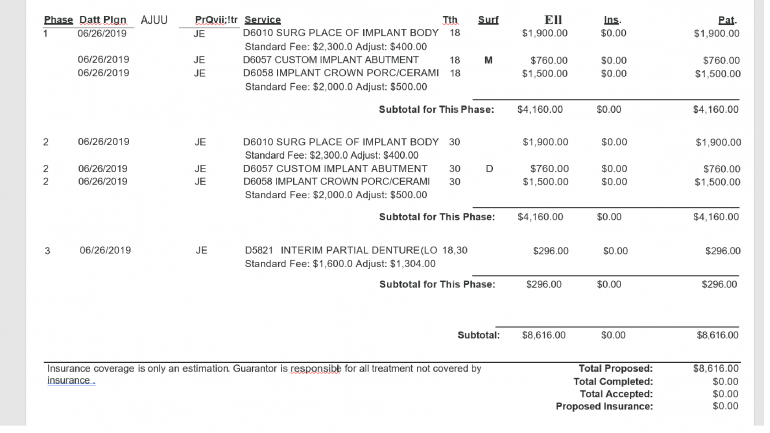
Dental Code D0160: Detailed and extensive oral evaluation
Dental Code D0160 represents a detailed and extensive oral evaluation performed by dental professionals to address specific oral health concerns. This code is used to describe a comprehensive examination of the patient's oral cavity, including a thorough assessment of the teeth, gums, and surrounding oral tissues.
Dental Code D0160 Price Range
As with other services, prices in America vary from dentist to dentist and city to city. The minimum charge for this service is $58 and the maximum $208. Most dentists charge around $135.
Low cost of living | Medium cost of living | High cost of living |
Memphis (Tennessee), Cincinnati (Ohio) | Miami (Florida), Denver (Colorado), Austin (Texas) | (New York (New York), San Francisco (California) |
$58 | $135 | $208 |
What does the code mean?
Dental Code D0160 refers to a problem-focused oral evaluation, which means that it is performed when a patient presents with specific concerns or issues related to their oral health. Unlike a routine oral examination, this code indicates that the dental professional will spend additional time and effort to thoroughly evaluate and diagnose the problem at hand.
Patient History and Chief Complaint
The first step in the detailed and extensive oral evaluation (D0160) involves obtaining the patient's comprehensive medical and dental history. This information helps the dental professional understand the patient's overall health, previous dental treatments, and any specific concerns they may have. The chief complaint is also recorded, which is the specific reason for the patient's visit and the primary focus of the evaluation.
Extraoral Examination
During the extraoral examination, the dental professional evaluates the patient's face, neck, and temporomandibular joint (TMJ) area for any abnormalities. They assess the symmetry of the face, palpate the lymph nodes, and examine the TMJ for signs of dysfunction or discomfort. This step helps identify any potential issues that may contribute to the patient's oral health concerns. In addition, during the extraoral examination, the dental professional may also assess the patient's posture and muscle tension in the head and neck region. This evaluation can provide valuable insights into the patient's overall musculoskeletal health and help detect any underlying conditions that could affect the oral health and function. Furthermore, the dental professional may use diagnostic tools such as imaging technology to assist in the comprehensive evaluation of the extraoral structures.
Intraoral Examination
The intraoral examination involves a meticulous assessment of the oral cavity, including the teeth, gums, tongue, and other oral tissues. The dental professional examines the teeth for signs of decay, cracks, or other structural problems. They also evaluate the gums for signs of inflammation, recession, or periodontal disease. Any abnormalities or suspicious areas are carefully documented.
Diagnostic Tests and Imaging
Depending on the patient's condition and the specific concerns, additional diagnostic tests and imaging may be performed. These can include dental X-rays, intraoral photographs, or other specialized tests to aid in the diagnosis. These tests provide valuable information for formulating an accurate treatment plan. Furthermore, advanced imaging techniques such as cone-beam computed tomography (CBCT) may be utilized to obtain detailed three-dimensional images of the oral and maxillofacial structures. CBCT scans can help in the assessment of complex dental conditions, such as impacted teeth, temporomandibular joint disorders, or evaluation of bone quality for dental implant placement. These diagnostic tests and imaging technologies enhance the dentist's ability to make precise diagnoses and tailor treatment approaches to each patient's unique needs.
Consultation and Treatment Planning
After completing the detailed examination and reviewing the diagnostic findings, the dental professional discusses the results with the patient. They explain any issues or conditions discovered during the evaluation and suggest appropriate treatment options. The treatment plan may include restorative procedures, periodontal therapy, orthodontic intervention, or referrals to specialists if necessary. In addition, during the consultation and treatment planning phase, the dental professional takes into account the patient's preferences, budget, and overall oral health goals. They collaborate with the patient to develop a personalized treatment plan that addresses their unique needs and desires. The dental professional also educates the patient about the potential benefits and risks associated with each treatment option, empowering them to make informed decisions about their oral health.
Summary of Dental Code D0160
Dental Code D0160 represents a comprehensive evaluation procedure known as a detailed and extensive oral evaluation - problem focused, by report. This code is used when a patient presents with specific concerns or issues related to their oral health. The procedure involves several steps, including obtaining the patient's medical and dental history, extraoral and intraoral examinations, diagnostic tests, and consultation for treatment planning. By utilizing this code, dental professionals can provide a thorough assessment of the patient's oral health, diagnose underlying problems, and develop personalized treatment plans to address the patient's concerns effectively.
It is important to note that the application of Dental Code D0160 may vary depending on the specific guidelines and protocols established by dental associations or insurance providers. Therefore, it is recommended to consult with your dental professional or refer to the relevant coding guidelines for accurate interpretation and implementation of this code.
In conclusion, Dental Code D0160 plays a vital role in dental practice by facilitating a detailed and extensive oral evaluation for patients with specific oral health concerns. This code ensures that dental professionals can thoroughly assess the patient's oral health, diagnose underlying issues, and provide appropriate treatment plans. By adhering to the principles outlined in this code, dental professionals can deliver optimal care to their patients and contribute to their overall oral well-being.
Facing Dental Issues? Get a Detailed Evaluation at the Best Price! Compare costs with
Dr. BestPrice for personalized and affordable care.